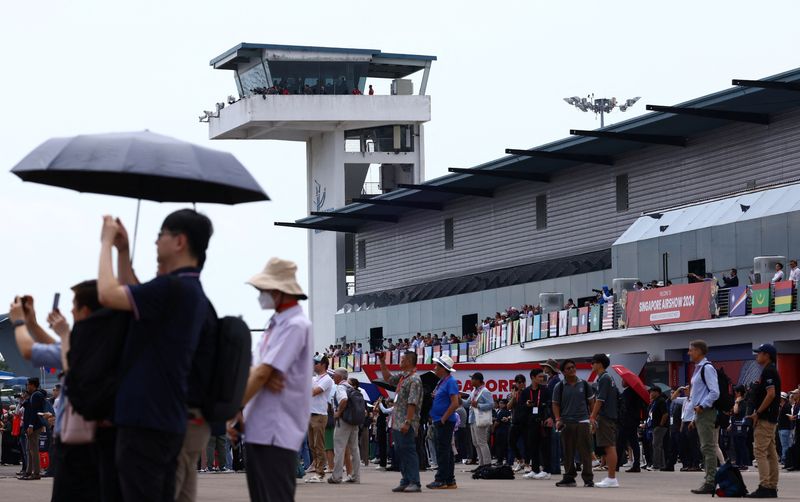
© Reuters. Individuals watch an aerial show on the Singapore Airshow at Changi Exhibition Centre in Singapore February 22, 2024. REUTERS/Edgar Su
By Joe Brock
SINGAPORE (Reuters) – Selling the Singapore Airshow on Sunday, the organiser of the occasion was requested what could be totally different about this 12 months’s aviation and defence jamboree. “Sustainability, sustainability, sustainability,” he replied.
The sound chew from Leck Chet Lam, managing director of the occasions enterprise Experia, was a precursor to 3 days filled with green-focused panels and bulletins, usually accompanied by the tagline “sustainable aerospace collectively”.
Regardless of the public-facing united entrance, the air present has uncovered deep divides over how the business can obtain its aim of “internet zero” carbon emissions by 2050.
Airline bosses, inexperienced gasoline producers and producers contradicted one another and pointed fingers over the thorniest challenge: who’s accountable for the sluggish take up of so-called sustainable aviation gasoline (SAF).
SAF, a biofuel made out of plant or animal supplies, reminiscent of used cooking oil or agricultural waste, can scale back carbon emissions by as much as 80% in contrast with conventional jet gasoline.
However it’s as much as 5 occasions dearer and there’s a big scarcity of feedstock wanted to make it. SAF is comparable in chemistry and efficiency to fossil jet gasoline.
20 years after airways started pledging to make use of biofuels, SAF makes up simply 0.2% of the worldwide jet gasoline market. The aviation business says that quantity will rise to 65% by 2050, though environmental teams say there is no such thing as a credible roadmap to realize the aim.
Willie Walsh, the director normal of the Worldwide Air Transport Affiliation, mentioned at an occasion on Monday that the one strategy to obtain “internet zero” was the widespread use of SAF.
“Demand shouldn’t be a difficulty,” Walsh mentioned, including that airways use “each drop” of SAF that’s produced.
BLAME GAME
The businesses that produce SAF inform a distinct story.
Hours earlier than Walsh’s feedback, Ong Shwu Hoon, vp of Asia-Pacific fuels at ExxonMobil (NYSE:), mentioned SAF demand was “very low”, discouraging producers.
Walsh, head of the most important airline commerce group, later hit again: “they might say that, as a result of they do not wish to produce any (SAF)”.
Exxon has mentioned it’s ramping up SAF manufacturing and is dedicated to supporting the aviation business’s net-zero aim.
Environmental teams say the blame sport over why SAF is struggling exemplifies an business that units arbitrary targets with no agreed upon plan to get there.
“This chicken-and-egg debate is getting previous and counterproductive,” mentioned Jo Dardenne, aviation director at Transport and Surroundings, a Brussels-based non-governmental organisation.
“How can the business placed on a straight face when asserting internet zero by 2050, when SAF uptake is lower than 1% right this moment and over 40,000 new planes will take to the skies within the subsequent 20 years,” Dardenne mentioned.
Dardenne known as for regulators to take management and put strict mandates in place for SAF manufacturing and use.
Some airline bosses talking on the air present equally sceptical of the business’s SAF plan.
Riyadh Air Chief Working Officer Peter Bellew mentioned at a panel dialogue on Tuesday that there wasn’t sufficient feedstock to hit the business’s SAF targets. Bellew advised that making air site visitors management extra environment friendly could be a faster strategy to minimize emissions.
On the identical panel, Yasuhiro Fukada, co-founder of the Japanese low-cost airline Zipair, mentioned he was specializing in reducing plastic packaging on planes as a result of that was extra vital than inexperienced gasoline to the youthful “Gen-Z” customers his airline targets.
Many environmentalists contend that the idea of a “sustainable” air present is proof that the business is tone deaf about tackling a looming local weather emergency.
Reveals all over the world have been cancelled in the course of the COVID pandemic, however they’re now again in full drive.
As airline CEOs talked about paving a sustainable future inside an unlimited, air-conditioned plane hangar in Singapore, exterior fighter jets and army helicopters carried out mind-bending aerial tips, spewing exhaust into the sky.
On the bottom, delegates who have been flown in from all over the world sat in snaking site visitors queues attempting to enter and exit the present.
“Days of occasions like this should certainly be numbered if we’re severe about local weather,” mentioned Robin Hicks, deputy editor of Eco-Enterprise, a Singapore-based environmental group.

